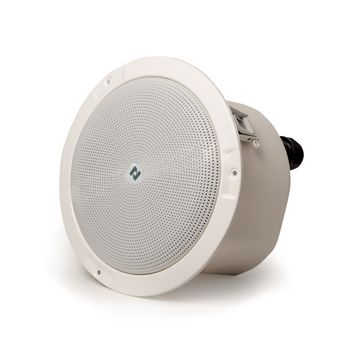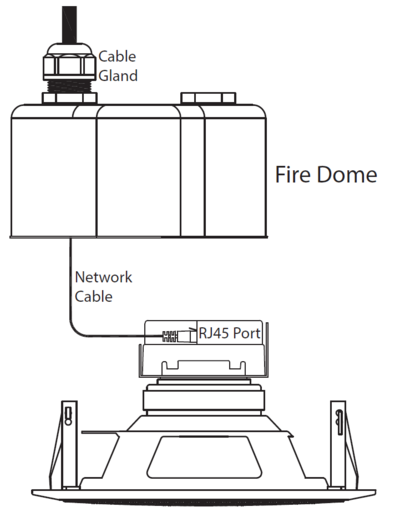ELSIR-10CM: Difference between revisions
From Zenitel Wiki
| Line 37: | Line 37: | ||
(This option is available as from firmware 7.5.3.1). | (This option is available as from firmware 7.5.3.1). | ||
Talkback and Automatic Volume Control will no longer work when the microphone is disabled. | |||
== ONVIF support == | == ONVIF support == | ||
Revision as of 10:04, 26 May 2023
ELSIR-10CM is a network ceiling loudspeaker with a built-in 10W amplifier and microphone. The microphone is used e.g. for talkback and for Automatic Volume Control.
HowTo video
Installation
- Remove the fire dome.
- Pass the network cable through the cable gland.
- Terminate the cable end with an RJ45 connector.
- Plug the network cable connector into the RJ45 port on the unit.
- Optional - Check that the microphone (located behind speaker grille) and speaker are connected.
- Replace the fire dome.
Note: Ground the unit by using available screws on the speaker chassis.

|
Installation of the speaker must be done using shielded Ethernet cables with grounding at the switch end. |
Configuration
The loudspeaker can operate in three different modes, depending on what kind of server it should register to. Choose one of the links below according to what mode you need to configure.
Conversation mode
To prevent acoustic echo during two-way communication with the speaker, the speaker will be in "PTT-mode" (Simplex mode). This means that the operator needs to press the M-key or (or the *-key on an ITSV phone) to talk, and release the M-key (or press the #-key) to listen. This mode of operation is default when the IP speaker is used in Edge or SIP mode. When used in ICX-AlphaCom mode, one have to configure "PTT-mode".
Disabling the microphone
The microphone can be disabled by logging into the web interface of the loudspeaker, enable "Advanced Configuration" mode, and navigate to Audio Settings > Audio Inputs, and set Internal Microphone = Not Connected. (This option is available as from firmware 7.5.3.1).
Talkback and Automatic Volume Control will no longer work when the microphone is disabled.
ONVIF support
Zenitel IP Speakers support the ONVIF protocol.
ONVIF Profile S:
The IP Speaker supports ONVIF "profile S" capabilities, similar to video devices. This enables an ONVIF VMS Client to automatically discover the IP Speaker and monitor the built-in microphone.
The IP Speaker is streaming video that shows JPEG image of the Zenitel logo, using 1 FPS (Frame Per Second) to provide compatibility with various VMS systems. Maximum RTSP stream count is 1 microphone audio, 1 JPEG video and 1 backchannel audio. RTSP PLAY will respond with 453 "Not Enough Bandwith" if that limit is breached.
- The IP Speaker is using TCP port 8095 for ONVIF
- HTTP tunneling is done over RTSP TCP port 554
ONVIF Audio Backchannel:
The IP Speaker supports the ONVIF audio backchannel, as defined in ONVIF Profile T. This enables an ONVIF VMS Client to send audio to the IP Speaker.
ONVIF configuration is done from the Web interface of the IP Speaker.
Restore Factory Defaults and Software Upgrade
The ELSIR-10CM IP Speaker has a Turbine kit TKIS-2 inside.
- Restore Factory Defaults
- Upgrade via the station web interface
- Upgrade using the IMT tool
- Automatic Software Upgrade (SIP mode only)
- Software Release Notes
Connectors, Indicators and Dimensions
The ELSIR-10CM IP Speaker has a Turbine kit TKIS-2 inside.
Software Requirements
If the IP Speaker is used with an AlphaCom XE server, the server must have minimum version 11.2.3.7.



